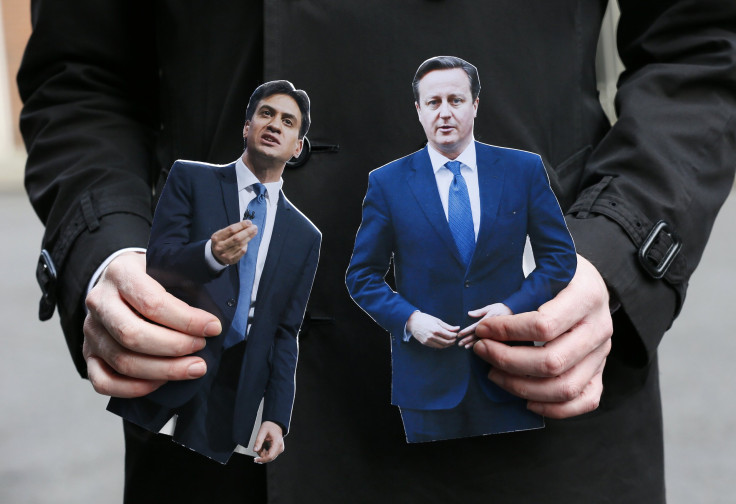Cameron Miliband Election Debate: Who Came Out On Top In The 'Battle For Number 10?'

Polls taken shortly after Sky News’ tense “Battle for Number 10” broadcast featuring tough interviews with British Prime Minister David Cameron and Labour Party leader Edward Miliband show that more viewers thought their current PM came out on top in the pseudo-debate, which didn’t actually pitch the two politicians against each other in a head-to-head debate. Miliband and his Labour Party hope to unseat Cameron’s ruling Conservative Party in general elections on May 7. Cameron has said he won’t seek a third term as prime minister.
The format of the “Battle for Number 10” was two-parted. Miliband and Cameron separately had a sit-down interview with the bulldog journalist Jeremy Paxman and audience Q&A moderated by Sky News anchor Kay Burley. Highlights included Cameron’s statement that he could not live on a zero-hour contract (in which employers can hire employees for non-consistent work) and Miliband’s assertion that “hell yes,” he is tough enough to be prime minister.
Cameron polled out on top of most survey questions, including who “had better arguments,” “was more convincing” and “was the more appealing personality.” Nineteen percent of people couldn't decide if either actually answered the questions they were given, while 37 percent thought Miliband did and 44 percent believe Cameron did. Both were seen skirting some of the toughest questions they were asked. Overall, 47 percent of survey-takers thought Cameron won the debate, while 42 percent thought Miliband did and 12 percent couldn't decide. Cameron also managed to get a higher percentage of favorability with prospective Labour voters than Miliband got with Conservative voters. Some said Paxman got too personal with his questions in his interviews with both Cameron and Miliband.
Surely the only thing to come out of tonight's leaders debate is #paxman is just a media bully who can't say or do nothing wrong
- Phil (@pieandpint19) March 27, 2015Miliband didn’t fall much behind Cameron in most regards, usually polling within single digit percentage points behind the two-term Conservative PM. Miliband is seen as the underdog and some thought he performed well under the intense pressure of Paxman.
Miliband admitted some mistakes made by the Labour government in power before Cameron and his Conservative party won big in 2005, like its incorrect immigration figures and “lax” attitude toward the inequality gap. He faltered on questions about Labour party spending but recovered later after answering Paxman’s assertion that people think he is a “North London geek,” with a strong “Who cares?”
Ed Miliband tries to take the front foot in his Paxman interview and I don't think it quite worked at first. #BattleForNumber10
- Darren (@AsanteDarren) March 27, 2015Cameron appeared more poised than Miliband, offering more hard numbers to back up his claims about spending, budget cuts and wages. He staunchly defended the “tough decisions” his government made to cut waste instead of raise taxes, but failed to give solid answers on where welfare cuts would actually fall. Both admitted that partisan bickering has made the government look bad. The Guardian asked undecided voters their opinions on the debates.
“Still had more faith in Cameron by the end of the debate,” said one voter. “However, I thought Miliband came across as far better than usual. Now more confused than ever!”
Miliband scored well with social media users, based on a tracker run by the Centre for the Analysis of Social Media. Around 30,000 people tweeted about Cameron, three times more than for Miliband, but the response was overwhelmingly negative, with two out of every three tweets about the PM being negative. Around 62 percent of tweets about Miliband on the other hand, were considered “cheers” and 38 percent were considered “boos,” according to the research center.
The disparity raised questions about the ICM’s polling methods, with some asking if ICM finished polling before the end of Miliband’s exchange with Paxman, which could have hurt his numbers.
Watch the entire “Battle for Number 10” and the poll taken shortly after below:
Gdn/ICMFlashPollMilibandCameron
© Copyright IBTimes 2025. All rights reserved.






















